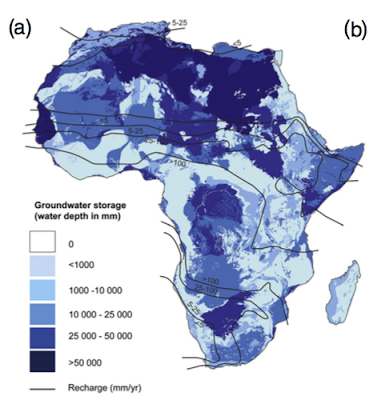What Good is Groundwater?
In an
earlier post, I mentioned that the water crisis in Africa is complex and somewhat misunderstood. A common misconception is that there are insufficient water
resources on the African continent to sustain its vast population. In fact,
maps published in a paper by MacDonald et al. (2012) suggest the opposite. Their
research reveals that groundwater reserves across Africa are more than 100
times the annual renewable freshwater resources. The extensive aquifer systems
beneath the continent hold approximately 0.66 million km3 of freshwater. Looking back to my post on the current drought in South Africa, I explained how the Western Cape is suffering from the worst drought in over a century due to the El Nino. MacDonald et al (2012) say that South Africa has more freshwater in groundwater stores than approximately
two-thirds of other African countries. There is no doubt that the extraction of
this groundwater has the potential to overcome the water crisis.
 |
| Figure 1: Groundwater storage across Africa (MacDonald et al., 2012) |
At present,
80% of the food grown in Africa relies on surface waters, and less than 5% of
global freshwater withdrawals go to Africa for agricultural purposes. Water
withdrawals in Africa are focussed in Northern Africa and some around the coast
of East Africa and Madagascar. Most of West and Central Africa relies on
surface and rainwater. It is the dependence
upon rain fed agriculture in Sub-Saharan Africa that leaves many regions
vulnerable to drought. As groundwater is protected from evapotranspiration, it is superior to surface water in hot climates such as in Africa. As well as
its resistance to evapotranspiration, groundwater would be a better solution to
the African water crisis than surface water as it is also less susceptible to
contamination, overcoming the sanitation issues associated with drinking water
in Africa. Surface waters such as streams are at high risk of contamination
from human and bird waste, transport fume, and agricultural runoff such as
pesticides. Being in the subsurface, water held in aquifers is largely
protected from such contamination. What’s more, groundwater undergoes
filtration as it travels through rocks.
However, it
is never just that simple. For starters, there are issues over who should have
access to the groundwater. An estimated 80 aquifers across the Africa fall into
the boundaries of more than one country. If one country were to begin pumping
heavily from an aquifer system that is shared with others, this could lead to even
more political unrest than what currently exists. Furthermore, there is the
issue of whether or not the groundwater can be accessed. A paper by Giordano (2006) outlines the distinct geological zones across SSA. Approximately 40% of
the region is Crystalline Basement Rock, which has low transmissivity and so it
a poor supply source of groundwater. Hence, groundwater is not a solution to
drought and resultant food supply issues in all regions.
To
summarise, groundwater has the potential to overcome the challenge of drought
across Africa, and the associated food crisis. In the areas where extraction is
possible, the freshwater in aquifers could be used to increase the percentage
of land under irrigation across the continent, and increase both water and food
security during times of drought. So as not to deplete the resource, aquifer
pumping should only be done when the use of surface water is not viable- over-abstraction
can also lead to land subsidence and saline intrusion (Ogunba, 2012). This
solution would require agreements amongst stakeholders i.e. agreements between
the countries whose boundaries lie above the aquifers.

Hi Emma,
ReplyDeleteThank you for the interesting blog post and the map you've included. It definitely makes you realise that all of Africa has a vast amount of groundwater reserves, especially in places you would not expect, such as countries in the Sahara desert.
You highlight potential transboundary conflict as a result of the nature of groundwater. This is quite a serious issue, considering the continents history with war (civil wars to be more specific). As the demand for water becomes more desperate in Africa with the impacts of climate change, are you worried that political unrest may lead to violent conflict, or do you think countries will be more collaborative in nature?
Best wishes,
Anparasan
Hi,
DeleteIt is hard to give an exact answer to your question! Given the current state of violence in countries such as South Sudan, I would say it is likely that "water wars" are inevitable. However, there are much more peaceful parts of Africa, such as Kenya, for example. In these parts I suspect conflict over water resources would be far less violent. I hope this answers your question.
Emma